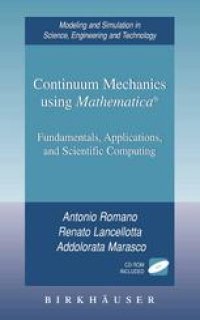
Ebook: Continuum Mechanics using Mathematica®: Fundamentals, Applications and Scientific Computing
- Tags: Mechanics, Continuum Mechanics and Mechanics of Materials, Theoretical and Applied Mechanics, Applications of Mathematics, Mathematical and Computational Physics, Mathematical Modeling and Industrial Mathematics
- Series: Modeling and Simulation in Science Engineering and Technology
- Year: 2006
- Publisher: Birkhäuser Boston
- Language: English
- pdf
This book's methodological approach familiarizes readers with the mathematical tools required to correctly define and solve problems in continuum mechanics. The book covers essential principles and fundamental applications, and provides a solid basis for a deeper study of more challenging and specialized problems related to elasticity, fluid mechanics, plasticity, materials with memory, piezoelectricity, ferroelectricity, magneto-fluid mechanics, and state changes.
Key topics and features:
* Concise presentation strikes a balance between fundamentals and applications
* Requisite mathematical background carefully collected in two introductory chapters and two appendices
* Recent developments highlighted through coverage of more significant applications to areas such as porous media, electromagnetic fields, and phase transitions
Continuum Mechanics using Mathematica® is aimed at advanced undergraduates, graduate students, and researchers in applied mathematics, mathematical physics, and engineering. It may serve as a course textbook or self-study reference for anyone seeking a solid foundation in the field.
This book's methodological approach familiarizes readers with the mathematical tools required to correctly define and solve problems in continuum mechanics. The book covers essential principles and fundamental applications, and provides a solid basis for a deeper study of more challenging and specialized problems related to elasticity, fluid mechanics, plasticity, materials with memory, piezoelectricity, ferroelectricity, magneto-fluid mechanics, and state changes.
Key topics and features:
* Concise presentation strikes a balance between fundamentals and applications
* Requisite mathematical background carefully collected in two introductory chapters and two appendices
* Recent developments highlighted through coverage of more significant applications to areas such as porous media, electromagnetic fields, and phase transitions
Continuum Mechanics using Mathematica® is aimed at advanced undergraduates, graduate students, and researchers in applied mathematics, mathematical physics, and engineering. It may serve as a course textbook or self-study reference for anyone seeking a solid foundation in the field.
Content:
Front Matter....Pages i-xii
Elements of Linear Algebra....Pages 1-43
Vector Analysis....Pages 45-76
Finite and Infinitesimal Deformations....Pages 77-107
Kinematics....Pages 109-129
Balance Equations....Pages 131-153
Constitutive Equations....Pages 155-169
Symmetry Groups: Solids and Fluids....Pages 171-187
Wave Propagation....Pages 189-243
Fluid Mechanics....Pages 245-316
Linear Elasticity....Pages 317-366
Other Approaches to Thermodynamcis....Pages 367-378
Back Matter....Pages 379-388
This book's methodological approach familiarizes readers with the mathematical tools required to correctly define and solve problems in continuum mechanics. The book covers essential principles and fundamental applications, and provides a solid basis for a deeper study of more challenging and specialized problems related to elasticity, fluid mechanics, plasticity, materials with memory, piezoelectricity, ferroelectricity, magneto-fluid mechanics, and state changes.
Key topics and features:
* Concise presentation strikes a balance between fundamentals and applications
* Requisite mathematical background carefully collected in two introductory chapters and two appendices
* Recent developments highlighted through coverage of more significant applications to areas such as porous media, electromagnetic fields, and phase transitions
Continuum Mechanics using Mathematica® is aimed at advanced undergraduates, graduate students, and researchers in applied mathematics, mathematical physics, and engineering. It may serve as a course textbook or self-study reference for anyone seeking a solid foundation in the field.
Content:
Front Matter....Pages i-xii
Elements of Linear Algebra....Pages 1-43
Vector Analysis....Pages 45-76
Finite and Infinitesimal Deformations....Pages 77-107
Kinematics....Pages 109-129
Balance Equations....Pages 131-153
Constitutive Equations....Pages 155-169
Symmetry Groups: Solids and Fluids....Pages 171-187
Wave Propagation....Pages 189-243
Fluid Mechanics....Pages 245-316
Linear Elasticity....Pages 317-366
Other Approaches to Thermodynamcis....Pages 367-378
Back Matter....Pages 379-388
....